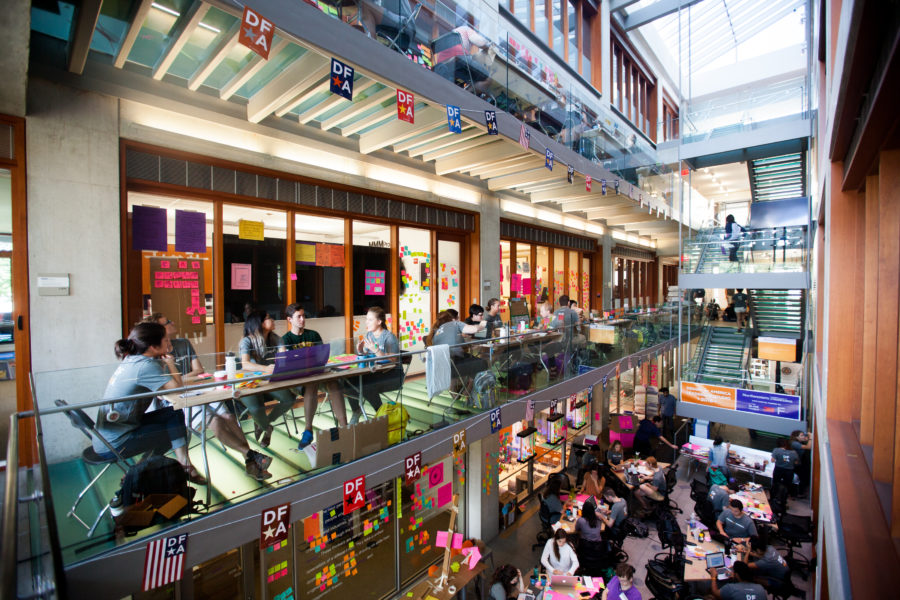Earlier this August, three Tulane students and I received the opportunity to go, fully funded by Taylor, to the Design for America Leadership Studio at Northwestern University’s d.school (design school).
For quick context, Design for America is an interdisciplinary network of designers, connected by a collective of college-based studios, the motivation to solve community-based problems, and the design thinking method. It creates an incredible space for practicing and implementing empathetic design with community partners and collaborating with people in fields you may never have considered to beforehand. Leadership Studio, through a bustling 2-day design sprint challenge (this year: “How can we improve the voting experience?”) and multiple breakout sessions, serves the purpose of providing further education, resources, practice, and support for student leaders to continue heading their colleges’ DFA studios. A group of us (Kristen Hill, Piper Serra, Rachel Cominsky, and Tom Karrel) are launching a DFA design studio at Tulane this Fall, so we jotted every tip and email down that we possibly could. Not completely out of place, because Design for America is all about getting everything in your brain out on some paper.

The environment my peers and I stepped into on Thursday night can be poignantly summarized by a one phrase and one group exercise.
The phrase, both jogging and challenging, uttered by a keynote speaker:
“Tell me how it can’t happen.”
The exercise, led by Liz Gerber (an associate professor at Northwestern and the mother of Design for America) on introduction night:
All 110 students circle up in a lopsided “O”. Liz, barely needing the mic in her hand, invites any student to ask a question they’ve always had, or present a half-baked idea, or introduce any topic they may want to know more about. Any person in the circle that knows ANYTHING about that subject raises their hand, summarizes shortly what they can give, and those people make a pact to connect afterward.
These key themes – optimism in problem-solving and respecting/seeking out community knowledge – wove through the entire weekend.
Optimism was integral to challenges faced in our solution development. For example, Rachel’s group had to scrap their college-centered voting campaign entirely when they did further external research and community partner interviews and realized that college-aged kids are already a highly incentivized voting group. In short, their user didn’t even have the problem they were trying to solve! They certainly weren’t the only group to throw ideas out, either. Fueled by optimism in a greater mission, rather than attaching themselves to the success of a particular solution, helped them continue problem solving, rather than giving up. Additionally, they respected the knowledge of the user community, and therefore were able to identify hitches like user-problem mismatch before they moved forward in any kind of tangible way.
The great thing about Leadership Studio that optimism and community runs through both its process and its internal interactions. As the only group that has not fully launched yet, our Tulane-repping crew is the youngest addition to the DFAmily. The amount of people willing to offer us advice in areas they felt experienced in, asking to Skype with us to bounce ideas back and forth, and genuinely extending their hands in friendship and academic partnership made the prospect of bringing something completely new to the Tulane community so much less daunting, and so much more attainable. I can’t wait for the future members of our studio to have this similar experience of instant integration.

To end off: I am a liberal arts gal – a rising senior studying Psychology and Political Science. My draw toward human-centered design makes sense, but is very new. For me, committing to a leadership event in design thinking like this and leading a projects in a design studio is like knowingly diving into cold, vigorous waves. Although the new cold is shocking, it is invigorating. The sea I am entering into headlong is vast and diverse. Each wave brings new insight that I slowly learn to work with, rather than against. The longer I splash around in it without hesitation, the warmer I become from my own efforts, and the more floating aids I spot put out by others. I can only comprehend the depth of possibilities in design if I explore them, even if this subject is intimidatingly large. Leadership Studio, and the relationships we started to form will be the largest inflatable life boat that I can imagine.

